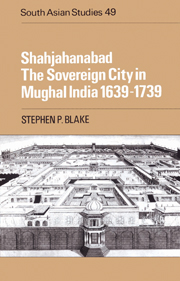Summary
The patrimonial-bureaucratic emperor intended the economy of the sovereign city to be an extension of his own household. Resources were to be managed and distributed as if the city were a great estate; there was to be no place for markets or independent economic agents. Goods were to be produced in household workshops and exchange was to take place between fellow clients within the precincts of the extended family. While this ideal was finally unattainable, the households of emperors, princes, great amirs, and other high-ranking mansabdars did dominate the economy of Shahjahanabad. They produced the bulk of the goods and services, controlled the process of exchange, and constituted the principal units of utilization or consumption.
Given the agrarian nature of the Mughal economy it is not surprising that little attention should have been devoted to economic activity in towns and cities. It is equally unsurprising, in view of the source of most of the evidence, that the available studies should concentrate on the coastal cities. While, these works are extremely useful, it is well to remember that they deal with atypical situations. The coastal centers were a distinct minority in the urban hierarchy of Mughal India. The towns and cities of the interior provided the great bulk of the urban population.
Production
“A city may be defined as a place where artisans (pisha-var) of various kinds dwell.” This statement by Abu al-Fazl sums up the state of manufacturing in the cities of Mughal India.
- Type
- Chapter
- Information
- ShahjahanabadThe Sovereign City in Mughal India 1639–1739, pp. 104 - 121Publisher: Cambridge University PressPrint publication year: 1991



